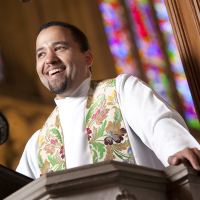To preach is to worship.
One normally hears about preaching in worship, but preaching is also worship. Before a preacher takes a biblical text for a sermon, s/he should take time to pray because the power of preaching comes from God. This is to conceive of the preacher as worshipper. Before we speak to others, we must first speak to God and listen to God.
When a pastor steps into a pulpit, s/he brings his or her prepared sermonic offering to burn on the coals of an altar–the pulpit. When a pastor calls a congregation to worship, everyone is being called to worship, including the pastor. Pastors lead worship but are also participants in worship. Preachers may easily perceive themselves as rhetoricians, biblical scholars, theologians, philosophers, or even cultural analysts; but, do we view ourselves as worshippers, as doxologians?
As the Westminster Shorter Catechism (1647-48) states, humanity is “to glorify God and to enjoy [God] forever.” The heart of the Christian vocation is consumed with doxology. Thus, the heart of any preacher should burn with this same desire, a yearning to glorify God in word and deed, including the preaching moment.
This means that preachers are called to be doxologians. Elizabeth Achtemeier rightly notes: “it is for God’s glorification alone that the Christian preacher labors.”1 At times, this doxological focus may become blurry because some preachers sense that their chief homiletical labor is to find a funny story or have some clever scriptural insight, rather than labor intensely to please God.
We preach for God and at the core of why we preach is love for God. Preachers are lovers–lovers of God and the Word of God, Jesus Christ, and are therefore called to love the people. This could be why preaching has been called an “act of responsive love toward God”2 and it is out of this overflow of love for God that some of the most effective preaching occurs. Who we are before God shapes what we do on behalf of God.
It is no coincidence that many homileticians stress the significance of the spiritual formation of the preacher’s life. Frank Thomas asserts that “preachers must have an intimate relationship with the Holy Spirit.”3 What this spiritual intimacy looks like may vary according to traditions and cultures, but having a spiritual relationship with God is essential because the “key to spiritual preaching is for the preacher to have a vital spiritual life.”4
If preachers do not know God, how can we expect others to come to know God? If preachers do not love God, how can we expect those in the pews to love God? Even those who emphasized homiletics as a branch of rhetoric historically, like John Broadus, name piety as the first requisite for a preacher and say that “it is bad rhetoric to neglect it.”5 The most important rhetoric is that of the heart and it is through worship that a preacher can develop it.
A life of worship and prayer feeds our preaching, which must be “steeped in the spirit of prayer.6 Before being a preacher, a preacher is a pray-er, a petitioner, a worshipper. Prayer and worship are the beginning of sermon preparation and fuel the entire preaching event. Without this understanding, one may come to think of preaching as being about ourselves and not God; but a preacher who prays as an expression of worship signals implicitly that the power in preaching really has nothing to do with us at all. Thus, we can conclude like Karl Barth that one’s preaching attitude should be “nothing from me, all things from God, no independent achievement, only dependence on God’s grace and will.”7
Worship shows reliance on God. I would add that dependence on God includes the understanding and the hope that God would shape a preacher’s whole life into a doxological one, not just personally or individually, but in one’s social interactions and involvement such that preachers are not just speakers and hearers of the Word, but doers of it. That way, onlookers can say about us what has been said about Jesus: “his life was the ‘amen’ to the proclamation of his lips.”8
1Elizabeth Achtemeier, “The Use of Hymnic Elements in Preaching,” Interpretation 39:1 (1985): 46, 59.
2Marjorie Suchocki, The Whispered Word: A Theology of Preaching (St. Louis: Chalice Press, 1999), 78.
3Frank Thomas, They Like to Never Quit Praisin’ God: The Role of Celebration in Preaching (Cleveland: Pilgrim Press, 1997), 29. Similarly, Bryan Chapell says, “We should not expect our words to acquaint others with the power of the Spirit if we have not met with him.” See his Christ-Centered Preaching: Redeeming the Expository Sermon (Grand Rapids: Baker Books, 1994), 24.
4Ronald J. Allen, Preaching and Practical Ministry (St. Louis: Chalice Press, 2001), 139-140.
5John Broadus, On the Preparation and Delivery of Sermons (1870; reprint, New York: Harper and Brothers, 1926), 7.
6James Earl Massey, The Burdensome Joy of Preaching (Nashville: Abingdon Press, 1998), 58.
7Karl Barth, Homiletics, trans. Geoffrey W. Bromiley and Donald E. Daniels (Louisville: Westminster John Knox Press, 1991), 90.
8James Forbes, The Holy Spirit and Preaching (Nashville: Abingdon Press, 1989), 43.

